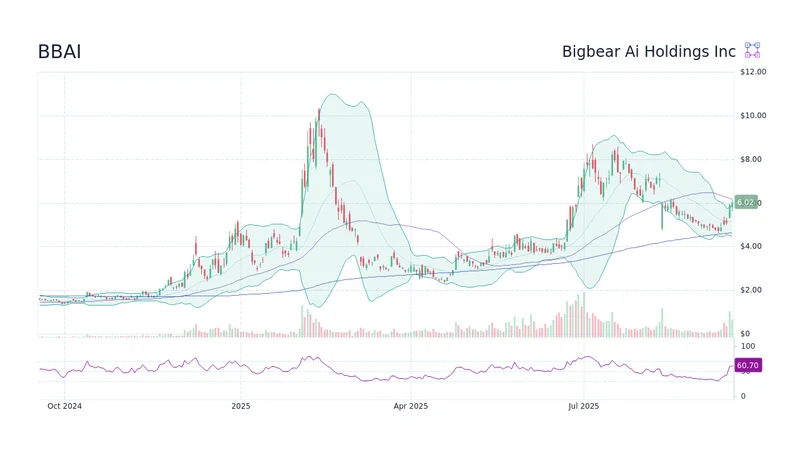BNB Signals | Binance Coin Trading Alerts & Insights
BNB Signals | Binance Coin Trading Alerts & Insights
Alright, folks, Nate Ryder here, and another quarter, another dose of corporate theater. BigBear.ai (BBAI) just dropped their Q3 2025 numbers, and if you just glanced at the headlines, you’d think it was a party. Shares jumped 15% post-market. The stock's up almost 28% this year, blowing the S&P 500 out of the water. Sounds great, right? Like they’re printing money. But let's pull back the curtain on this magic show, 'cause I'm telling you, what's underneath ain't always pretty.
So, BigBear.ai reports Q3, and it’s a classic mixed bag, spun to look like a win. They lost $0.07 per share (adjusted), missing the Zacks consensus estimate. Ouch. But wait, their GAAP loss was a slightly less terrible $0.03, which beat estimates. See how they do that? One number's bad, the other's just "less bad" and suddenly it's a victory. Give me a break.
Then there's revenue. They pulled in $33.1 million, which did edge out the $31.82 million consensus. Good for them. But here’s the kicker, the part that makes my cynical little heart go thump-thump: that $33.1 million is an $8.4 million drop from last year’s $41.51 million. A year-over-year decline. And why? Oh, just "lower revenue volume from certain U.S. Army programs." The Army, huh? The backbone of their whole "defense and national security" pitch? When the government contracts start drying up, or at least shrinking, that's not a blip on the radar; that's a flashing red light on the dashboard. You could almost feel the sweat dripping in the executive suite when those numbers came in, I bet.
I mean, are we really supposed to ignore a fundamental decline in their core business because they managed to beat a different loss metric and barely squeak past revenue estimates? My gut tells me this ain't sustainable. It's like patching a leaky roof with a piece of paper; it might hold for a minute, but the storm's still coming.

And what do you do when your core business is showing cracks? You go shopping, of course! BigBear.ai just signed a definitive agreement to acquire Ask Sage for a cool $250 million. Ask Sage, for those of you not fluent in corporate buzzword bingo, is a "generative artificial intelligence platform for secure distribution of AI models and agentic AI capabilities" built for defense and national security. Sounds fancy, right?
Here’s the deal: Ask Sage is projected to deliver $25 million in annual recurring revenue (ARR) in 2025. That's a six-fold increase from last year, which sounds impressive until you realize "six-fold" when starting from almost nothing can still be... well, not $250 million impressive. They're paying ten times Ask Sage's projected ARR. Ten times! That's not just a premium; that's like buying a used car for the price of a new Tesla because the seller promised it'll "definately" go 200 mph next year.
CEO Kevin McAleenan is all smiles, talking about this acquisition, and CFO Sean Ricker is already signaling they’ll keep up the M&A strategy for growth. Translation: "We can't grow fast enough organically, so we're gonna buy it." It's a classic move in the tech world. When your engine's sputtering, you don't fix it; you just bolt on a new, shinier engine and hope no one notices the flat tires and rusty chassis. This whole thing feels less like a strategic expansion and more like a desperate attempt to inject some AI pixie dust into their numbers and get the market excited again. And hey, it worked for a day, didn't it? The stock jumped! But for how long? Are we really meant to believe this quarter's reaffirmed full-year revenue guidance of $125 million to $140 million when their last quarter showed a significant revenue decline? I'm sorry, but that math just ain't mathing for me. Then again, maybe I'm just the crazy one here.
Look, BigBear.ai has topped revenue estimates in only one of the last four quarters. One! Their EPS record is only marginally better. This isn't a picture of consistent, organic growth. This is a company trying to buy its way into relevance, banking hard on the AI hype train. The market, God bless its easily distracted soul, is eating it up. But when you're paying a quarter-billion dollars for a company with $25 million in revenue, even if it's growing, you're not just buying a business; you're buying a story. And sometimes, stories, no matter how well-written, have a terrible ending.